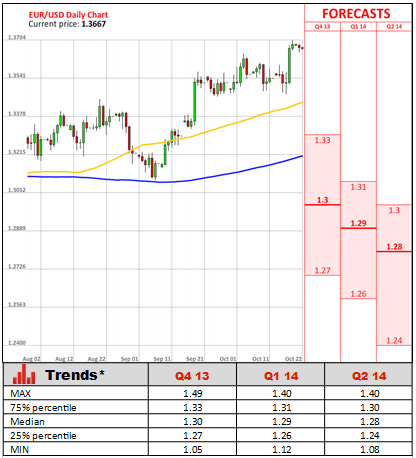A bunch of positive data for Europe's largest economy, Germany, came out on Monday, as Angela Merkel and Social Democratic Party moved closer in creation of a "grand coalition", while producer prices inched higher more than expected. After a monumental victory on election night concerns were raised that Merkel's Christian Democratic Union party would be able to create a strong coalition, as win was not big enough to govern on its own. After one month, the SPD agreed a series of economic demands, opening the door to coalition talks with Angela Merkel's party. SPD leaders suggested they would win concessions, including a minimum wage of 8.50 euros per hour from Merkel's bloc. An internal SPD document includes 10 demands which are non-negotiable. Amid an introduction of a minimum wage, the document also includes equal pay for men and women, bigger investment in infrastructure and education as well as common strategy to boost Eurozone growth and improve situation in the labour market. Though it is a big step for German politicians, coalition talks could last more than a month.
Note: This section contains information in English only.
A bunch of positive data for Europe's largest economy, Germany, came out on Monday, as Angela Merkel and Social Democratic Party moved closer in creation of a "grand coalition", while producer prices inched higher more than expected. After a monumental victory on election night concerns were raised that Merkel's Christian Democratic Union party would be able to create a strong coalition, as win was not big enough to govern on its own. After one month, the SPD agreed a series of economic demands, opening the door to coalition talks with Angela Merkel's party. SPD leaders suggested they would win concessions, including a minimum wage of 8.50 euros per hour from Merkel's bloc. An internal SPD document includes 10 demands which are non-negotiable. Amid an introduction of a minimum wage, the document also includes equal pay for men and women, bigger investment in infrastructure and education as well as common strategy to boost Eurozone growth and improve situation in the labour market. Though it is a big step for German politicians, coalition talks could last more than a month.

Tue, 22 Oct 2013 05:10:03 GMT
Source: Dukascopy Bank SA
"It's possible that unbridgeable differences arise during the talks so that a coalition isn't possible. But if you decide to take up coalition talks, then your goal is to bring them to a successful end."
- Sigmar Gabriel, SPD Chairman
A bunch of positive data for Europe's largest economy, Germany, came out on Monday, as Angela Merkel and Social Democratic Party moved closer in creation of a "grand coalition", while producer prices inched higher more than expected. After a monumental victory on election night concerns were raised that Merkel's Christian Democratic Union party would be able to create a strong coalition, as win was not big enough to govern on its own. After one month, the SPD agreed a series of economic demands, opening the door to coalition talks with Angela Merkel's party. SPD leaders suggested they would win concessions, including a minimum wage of 8.50 euros per hour from Merkel's bloc. An internal SPD document includes 10 demands which are non-negotiable. Amid an introduction of a minimum wage, the document also includes equal pay for men and women, bigger investment in infrastructure and education as well as common strategy to boost Eurozone growth and improve situation in the labour market. Though it is a big step for German politicians, coalition talks could last more than a month.
Also Monday German federal statistics office said nation's producer prices edged higher last month, owing to rising prices for oil and diesel, while factory gate prices were still noticeably lower than in the previous year. Producer price inched higher 0.3%, beating analysts' expectations for a 0.1% gain; however, PPI was 0.5% lower from September 2012.
© Dukascopy Bank SA
Actual Topics
Subscribe to "Fundamental Analysis" feed
Подписаться
Чтобы узнать больше о торговой платформе Forex/CFD, SWFX и получить другую информацию, связанную с торговлей,
пожалуйста, звоните нам или запросите обратный звонок.
пожалуйста, звоните нам или запросите обратный звонок.
Для получения дополнительной информации относительно сотрудничества,
пожалуйста, позвоните нам или запросите обратный звонок.
пожалуйста, позвоните нам или запросите обратный звонок.
Чтобы узнать больше о торговых платформах (Forex / Бинарные опционы) от Dukascopy Bank, торговой площадке SWFX или получить другую информацию, связанную с торговлей,
пожалуйста, позвоните нам или запросите обратный звонок.
пожалуйста, позвоните нам или запросите обратный звонок.
Чтобы узнать больше о торговой платформе Forex/CFD, SWFX и получить другую информацию, связанную с торговлей,
пожалуйста, звоните нам или запросите обратный звонок.
пожалуйста, звоните нам или запросите обратный звонок.
Чтобы узнать больше о Крипто / CFD / Forex торговых платформах, SWFX и получить другую информацию, связанную с торговлей,
пожалуйста, позвоните нам или запросите обратный звонок.
пожалуйста, позвоните нам или запросите обратный звонок.
Чтобы узнать больше о Представляющих агентах и получить другую информацию, связанную с торговлей,
пожалуйста, позвоните нам или запросите обратный звонок.
пожалуйста, позвоните нам или запросите обратный звонок.
Для получения дополнительной информации относительно сотрудничества,
пожалуйста, позвоните нам или запросите обратный звонок.
пожалуйста, позвоните нам или запросите обратный звонок.